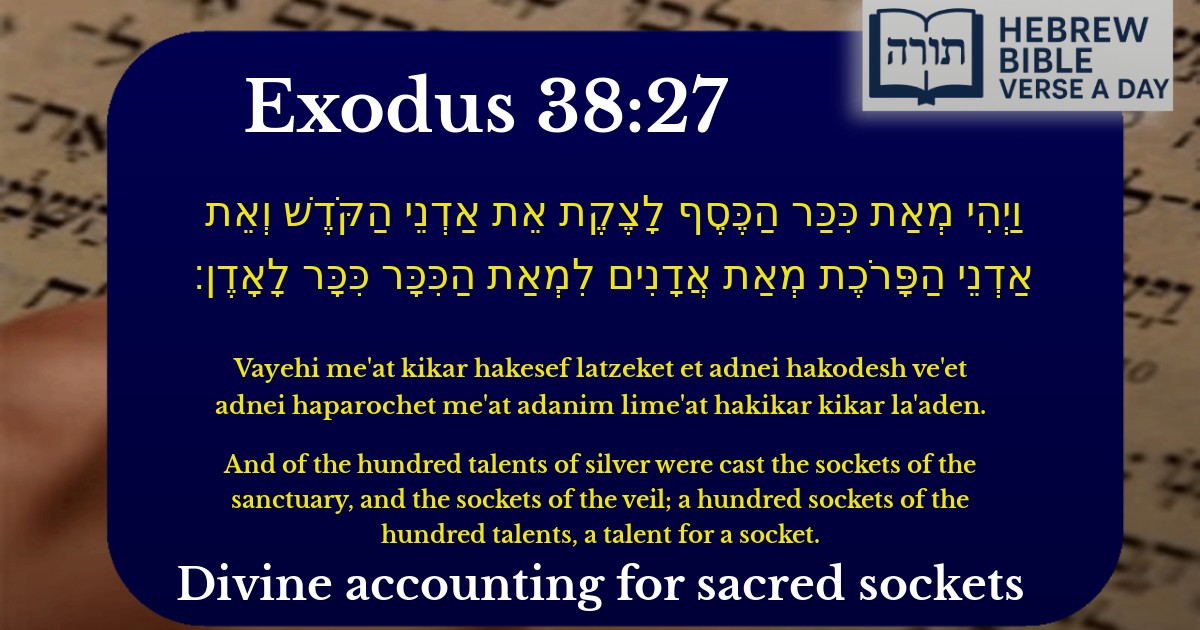Join Our Newsletter To Be Informed When New Videos Are Posted
Join the thousands of fellow Studends who rely on our videos to learn how to read the bible in Hebrew for free!
Hebrew Text
וַיְהִי מְאַת כִּכַּר הַכֶּסֶף לָצֶקֶת אֵת אַדְנֵי הַקֹּדֶשׁ וְאֵת אַדְנֵי הַפָּרֹכֶת מְאַת אֲדָנִים לִמְאַת הַכִּכָּר כִּכָּר לָאָדֶן׃
English Translation
And of the hundred talents of silver were cast the sockets of the sanctuary, and the sockets of the veil; a hundred sockets of the hundred talents, a talent for a socket.
Transliteration
Vayehi me'at kikar hakesef latzeket et adnei hakodesh ve'et adnei haparochet me'at adanim lime'at hakikar kikar la'aden.
Hebrew Leining Text
וַיְהִ֗י מְאַת֙ כִּכַּ֣ר הַכֶּ֔סֶף לָצֶ֗קֶת אֵ֚ת אַדְנֵ֣י הַקֹּ֔דֶשׁ וְאֵ֖ת אַדְנֵ֣י הַפָּרֹ֑כֶת מְאַ֧ת אֲדָנִ֛ים לִמְאַ֥ת הַכִּכָּ֖ר כִּכָּ֥ר לָאָֽדֶן׃
Parasha Commentary
📚 Talmud Citations
This verse is not quoted in the Talmud.


The Significance of the Silver Sockets
The verse (Shemot 38:27) describes the use of 100 talents of silver to cast the sockets (adanim) for the Mishkan (sanctuary) and the sockets for the parochet (veil). Rashi explains that these sockets served as the foundation for the Mishkan's beams, emphasizing their structural and spiritual importance. Each socket weighed exactly one talent, totaling 100 sockets for 100 talents, demonstrating precise divine measurement.
Symbolism of the Silver
The Midrash (Tanchuma, Pekudei 4) connects the silver used for the sockets to the atonement for the sin of the golden calf. Silver (kesef) is linguistically linked to longing (kisufin), representing the Jewish people's desire to rectify their mistake and reconnect with Hashem. The Ibn Ezra adds that silver, being a precious metal, signifies the enduring value of the Mishkan as a dwelling place for the Divine Presence.
The Number 100 and Its Meaning
The repetition of the number 100 highlights its significance. The Kli Yakar notes that 100 corresponds to the 100 blessings one should strive to recite daily (based on Devarim 10:12), suggesting that the Mishkan's foundation was built upon spiritual devotion. Additionally, the Sforno teaches that the uniformity of one talent per socket reflects the equal responsibility of each Jew in upholding the Mishkan's sanctity.
The Sockets as a Foundation